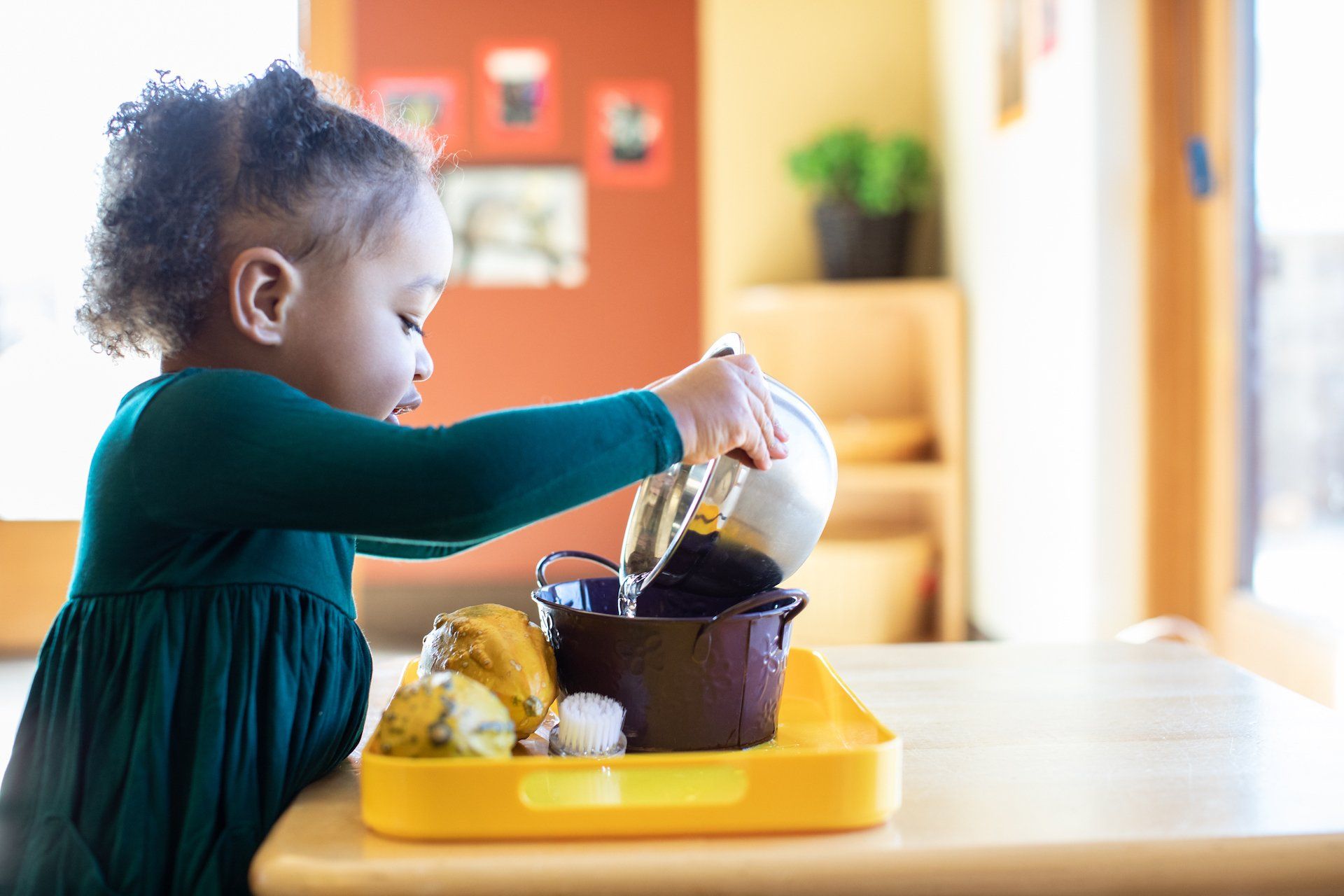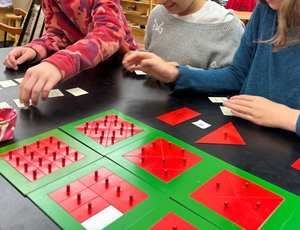What is Practical Life?

When you visit a Montessori school, you’ll likely hear the phrase “practical life.” We thought it might be helpful to provide a little more context so we can share why practical life is so important to what we do.
First, let’s break apart the phrase. “Practical” can mean the actual doing or use of something. The term “life" can be described as living things and their activity. So, when we combine the two terms, we can think of “practical life” as activity that is focused on doing something useful.
In Montessori, we offer young children useful activities that serve a real purpose. Children have beautiful child-sized materials that allow them to wash tables, dust shelves, polish silver, prepare food, and so much more. Although most traditional early childhood programs have a play area that includes cleaning items or kitchen toys, these items are for pretend, imitation, and play rather than for actually cleaning or cooking.
But why does a toddler need to polish their shoes or do laundry with a scrub board? Are the tasks drudgery? Isn’t childhood an age for play? To answer these questions, we need to look at what is happening during childhood, which is what Dr. Maria Montessori did over 100 years ago.
Origins of Practical Life Exercises
The exercises of practical life began in order to serve a very practical need. Dr. Montessori had responsibility for children who were being destructive in a building in the slums of Rome. The proprietors needed to take care of the building, yet the children were rather wild and unkempt. As a physician, Dr. Montessori knew the importance of hygiene in preventing illness. Thus, one of the first things she did was to offer basins of water and cakes of soap. Then Dr. Montessori showed the children how to wash their hands and faces.
What happened was unexpected. Once the children washed their hands and faces, they didn’t stop. They kept washing. They did it again and again. Dr. Montessori said the children repeated the activity as if driven by some kind of imperceptible force. Instead of stopping them, like adults are apt to do, Dr. Montessori watched. She wanted to see what would happen. With curiosity, patience, and powers of scientific observation, she observed a need that went way beyond washing hands. From these practical beginnings, came a very significant discovery for Dr. Montessori.
Montessori’s Discovery about Children and Work
Dr. Montessori discovered the fundamental difference between work as adults experience it and work as children experience it. Often, as adults, we think of work as bringing on fatigue. However, Dr. Montessori observed how work for children is energizing.
Young children have an intense urge to do things! Think about the crawling infant who is completely compelled to try to get up the stairs, so matter how many times we bring them back down or try to block the steps.
Typically we, as adults, stop children from doing certain activities because we think the action is too tiring, too difficult, too dangerous, too messy, or because it will be more efficient and faster for us to do it ourselves.
Yet young children have a compulsion to engage in activities with a huge amount of effort. In fact, young children will become quite distressed when their activity is interrupted.
Understanding Children’s Motivation
Young children’s goals for doing activities are not practical ones. They aren’t motivated by having clean hands or a polished candlestick. Dr. Montessori discovered that young children’s motivation to work and gain independence is part of their process of constructing themselves. They are motivated to interact with their surroundings in order to create who they are as humans. Children are working to coordinate and refine movements, gain independence, master sequences of activity, and essentially create their future personalities. It’s easy to tell when children are in this stage because they will do an activity repeatedly, even in one day or in one sitting. This is what Dr. Montessori observed when she offered basins of water and cakes of soap to the children in San Lorenzo.
Gradually, around the ages of four and five, children become fueled by a love and appreciation of their surroundings and their community. They want to put their skills to use! While the youngest children will wash a clean table ten times, slightly older children will wash a table once because it is dirty. Often older children will notice something that needs attending to, like a lot of dirty cloths in the laundry basket and want to wash the items to make sure everything is clean for the next day.
Making Activities Accessible
In Montessori settings, we make sure that the processes of everyday living are accessible to children. Items are sized for the children because it’s hard to sweep when the broom is larger than one’s body! Children also get to see and participate in steps that are often not visible to them, like what happens in the dishwasher. Thus, when we offer children the steps of washing dishes, we are gifting them with the awareness of each step involved: how we go from dirty dishes to clean dishes includes wetting the dishes, scrubbing them with soap, rinsing the dishes, and finally drying them.
We also slow down the movements involved so that children can see, absorb, and practice each necessary skill. When children can practice each step slowly and intentionally, they learn how to do things like unbuttoning or buttoning their sweater or tying their shoes. Having time and space to practice the activities allows children to be active participants in taking care of themselves and their community.
Some Outcomes of Practical Life Activities
How can getting oneself dressed or scrubbing a table help with children’s development? Practical life activities help children develop critical skills like intelligence and memory, concentration and focus, awareness and self-confidence, self-control and self-discipline, and the ability to problem-solve and think rationally.
When even the youngest children are following a complex series of steps in order to accomplish something like washing a cloth, they are developing their memory and intelligence. They see how to set up the basins of water, wet the cloth, get the soap, scrub, rinse, hang the cloth the dry, repeat, and then clean everything up when finished. Then they hold that sequence in their minds in order to do the activity themselves. In the process, they are also developing their capacity for logical ordered thinking.
In addition, when working on practical life activities, children strengthen their ability to reason. They have to consider things like whether they need to apply more polish or if the table is completely dry. As such, children begin to develop an awareness of their impact which also creates self-confidence. When they see that the table is dirty after pitting cherries and get the table scrubbing activity out, they have taken a step along the path of becoming logical problem-solvers.
Through the exercises of practical life, children also increase their self-control and self-discipline. Some of this self-control comes from the ability to put the needs of the community ahead of their own needs. A toddler who scoops avocado to make guacamole to share at snack may want to eat the avocado right away. However, they delay gratification in order to serve friends during snack time. Children also learn to put things away when they are finished using them, which helps establish a life-long habit of self-discipline.
We also offer challenges that help children develop skills that will lead to more concentration and focus. We might pose these suggestions as questions: Do you think you could wash this table without spilling a drop of water anywhere? How many times can you spoon the beans back and forth without spilling any? Offering these little points of consciousness provides children with a challenge that helps them strengthen their ability to concentrate and persevere, while also helping them refine their fine and gross motor skills.
From their very humble beginnings, the exercises of practical life provide children with so many benefits! In addition to developing the foundation for executive functioning skills (like task initiation, self-control, organization, planning and prioritizing, and holding information in working memory) practical life activities help children develop a deep love and appreciation for their surroundings and for those who live in their community.
Practical life activities are the cornerstone of Montessori classrooms. We invite you to come to see this remarkable work in action!






